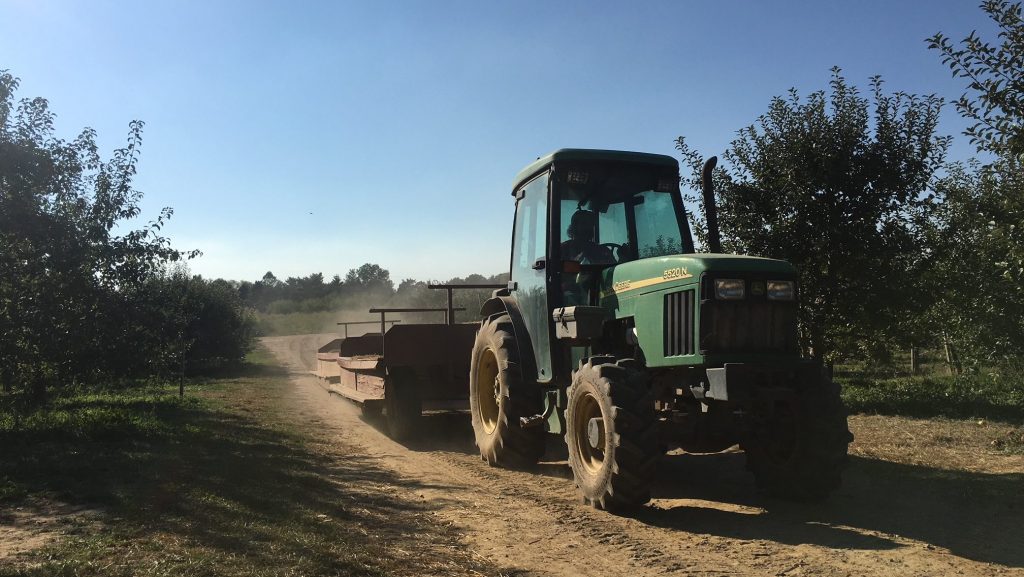Created Equal: Wage increases for migrant workers putting pressure on Michigan farmers
Created Equal May 20, 2024Detroit News reporter Grant Schwab and Gonzalo Peralta, staff attorney for the Michigan Immigrant Rights Center, joined the show to discuss the visa program and its downsides for both Michigan farmers and agriculture workers.

Michigan’s robust agriculture industry has come to rely quite a bit on migrant workers and the visas that bring them to our country. But a recent hike in the minimum pay for these workers has sparked a debate about the cost to farms — and potentially consumers — as well as about the pathway to opportunity for migrants.
The H-2A Visa Program was instituted in 1986 to allow Michigan agricultural employers to bring in foreign workers to fill jobs not taken by United States citizens. The program works to guarantee that both U.S citizens and migrant agricultural workers have the same terms and benefits of employment.
However, as U.S. economic and employment conditions have changed since the mid-’80s, migrant worker advocacy groups have identified issues with the visa program, and it has become less sustainable for Michigan farmers.
In a recent article for The Detroit News, reporters Grant Schwab and Candice Williams highlighted one of several west Michigan farms that are struggling to keep up with the annual cost increases in the program. The hourly wage for this year is $18.50 base pay, up from $17.34 in 2023. There are also other costs farmers must cover for workers, including housing and transportation, the report said.
Schwab joined Created Equal on Monday, along with Gonzalo Peralta, staff attorney for the Michigan Immigrant Rights Center, to discuss the visa program, its effect on Michigan farmers, and how it makes migrant workers vulnerable to wage and labor exploitation by their employers.
Subscribe to Created Equal on Apple Podcasts, Spotify, Google Podcasts, NPR.org or wherever you get your podcasts.
Guests:
Grant Schwab is a reporter for The Detroit News that covers policy and politics in Washington D.C. He says that the issues in the visa program link to broader issues in ethical production and consumption.
“To improve conditions for farmers here, or to make the business more sustainable, you need to ask people to do, what I’ll say is: internalize their externalities. Every time you’re paying a really low cost for something, there are sort of hidden costs to the world associated with that,” he said.
He adds that by having consumers pay more for goods, “There’s an added benefit of saying ‘Hey, you’re paying more, but you get to know that your purchase is coming from a place that treats its workers well or uses sustainable agriculture practices.’ But that’s just a really difficult thing to ask people.”
Gonzalo Peralta is a staff attorney for farm worker and immigration rights at the Michigan Immigration Rights Center. He says that negative stigmas against Mexican immigrants downplays their impact as essential workers.
“So many migrant workers who work in food industries, in agriculture, are essential workers. They’re crucial to allowing our basic well-being,” he said. “I just think we’re doing ourselves a disservice by succumbing to this fear-mongering as opposed to recognizing the benefits that we receive from migrant populations, who so often do these jobs that so many other individuals are unwilling to do.”
Listen to Created Equal with host Stephen Henderson weekdays from 9-10 a.m. ET on 101.9 WDET and streaming on-demand.
Trusted, accurate, up-to-date.
WDET strives to make our journalism accessible to everyone. As a public media institution, we maintain our journalistic integrity through independent support from readers like you. If you value WDET as your source of news, music and conversation, please make a gift today.
